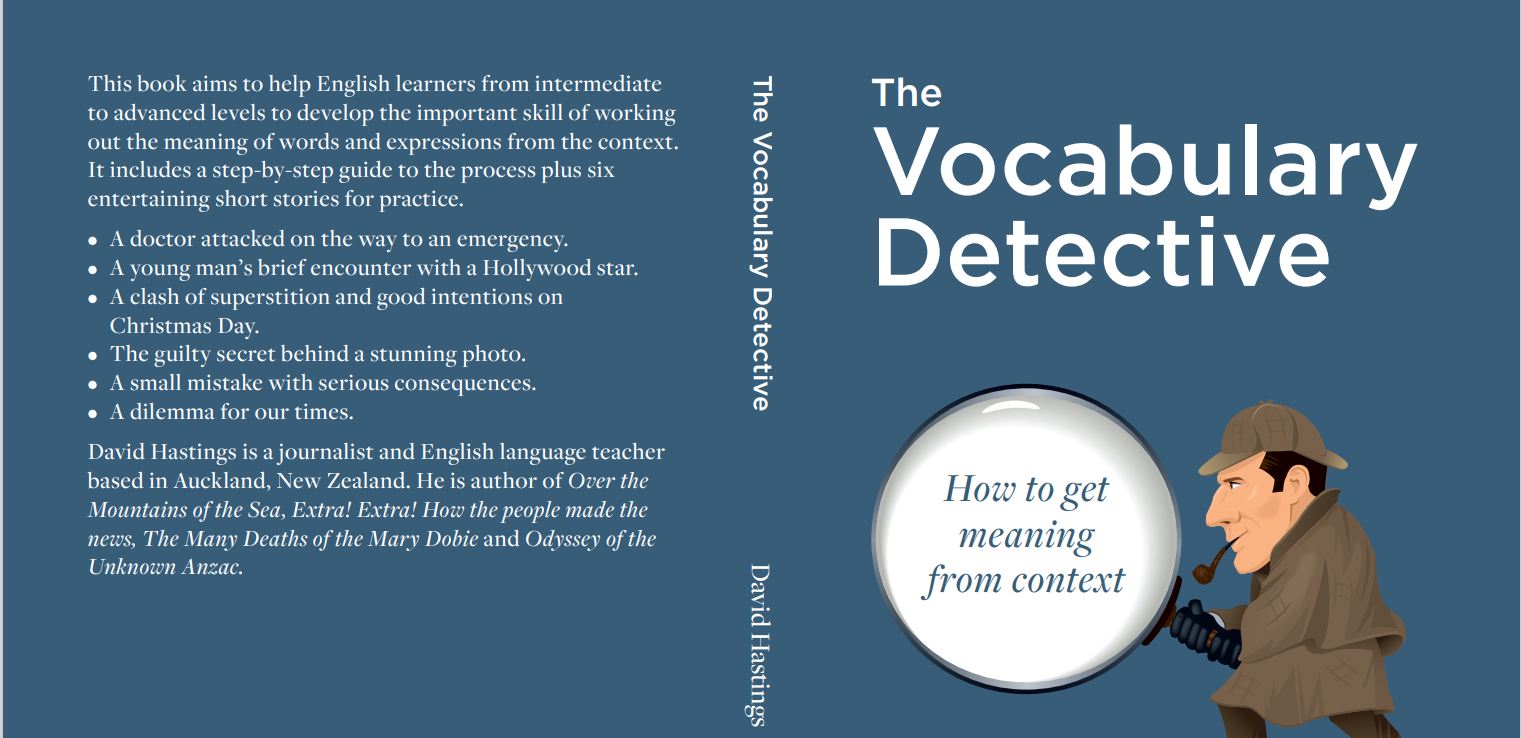The Vocabulary Detective, reviewed by the Author
David Hastings is a journalist and English language teacher based in Auckland, New Zealand. He is author of Over the Mountains of the Sea, Extra! Extra! How the people made the news, The Many Deaths of the Mary Dobie and Odyssey of the Unknown Anzac. Email: dmhcosmo@outlook.com

The book aims to help English learners from intermediate to advanced levels to develop the important skill of working out the meaning of words and expressions from the context. All language learners are encouraged to do this to expand their vocabulary, but it is easier said than done.
The challenge for teachers is not just to tell students to do it but show them how to do it. And even more importantly to give them the confidence to jump out of the classroom and away from the textbooks and begin to strengthen their grasp of the language autonomously.
As the title suggests, The Vocabulary Detective presents the skill as a kind of mystery to be solved. The reader searches for clues by asking a series of questions, just like a detective trying to solve a crime. The book contains a detailed guide to the types of clues to look for and the simple questions needed to find them. The idea is that it should be playful, like a game.
In keeping with the tone of making it enjoyable, there are six entertaining short stories for practice. These include specific words and expressions highlighted plus notes on the questions and the clues. The challenge for learners is to hone their skill and work out the meanings without using a dictionary.
There are several important benefits. Perhaps the most important is that learners get a sense of how words are used in different ways and with different meanings when they appear in different contexts. Another is that they are more likely to remember words if they have gone through the process of trying to work out the meaning, regardless of whether they guessed correctly or not.
Also, someone who has developed the skill will rely less on the dictionary and therefore reading will be more of a pleasure. The value of this is hard to overestimate. As most language teachers and learners recognise, reading is one of the best ways to expand vocabulary.
In a more general sense, the skill is a great confidence builder. It should help learners to see that they can use the language independently, outside the classroom in unrehearsed and unexpected situations.
The stories are:
- A doctor attacked on the way to an emergency.
- A young man’s brief encounter with a Hollywood star.
- A clash of superstition and good intentions on Christmas Day.
- The guilty secret behind a stunning photo.
- A small mistake with serious consequences.
- A dilemma for our times.
The Vocabulary Detective was that it is available on Amazon as either a paperback or Kindle e-book.
A New Title from Crown House Publishing Limited: Bringing Forth the Bard: A guide to teaching Shakespeare in the English classroom
Lila and the Dragon Helps Students Discuss Complex Issues
Brandon W. Wallace and Calmsie, United States of AmericaReady to Run Launches ELT Video Featuring Neurodiversity
The Vocabulary Detective, reviewed by the Author
David Hastings, New ZealandThe Wolf was Not Sleeping (Police Care UK edition): Supporting the Children of First Responders with a Heart-warming Bedtime Story
Avril McDonald, New ZealandTeaching Critical Thinking in the Context of Political Rhetoric A Guide for Classroom Practice
Joseph Sanacore, Professor, Long Island University, Brookville, NY